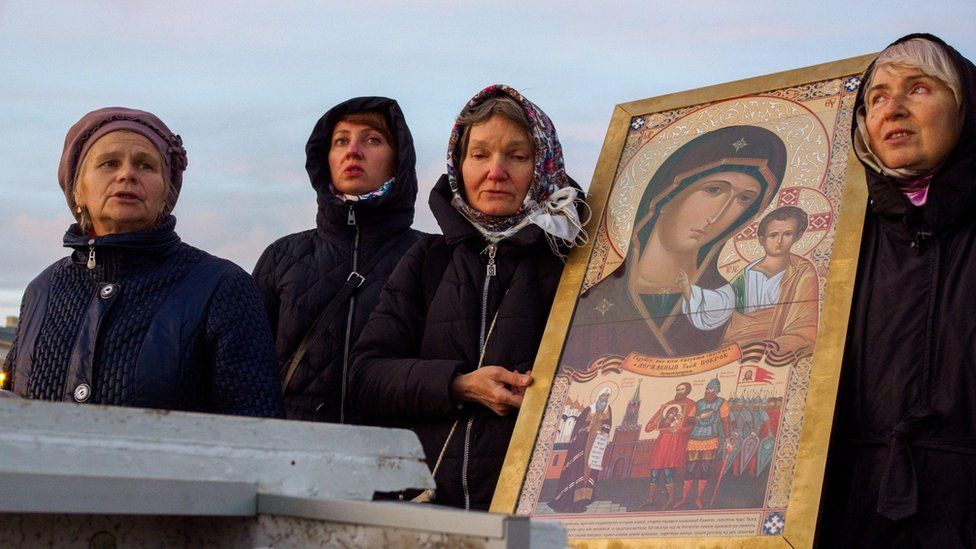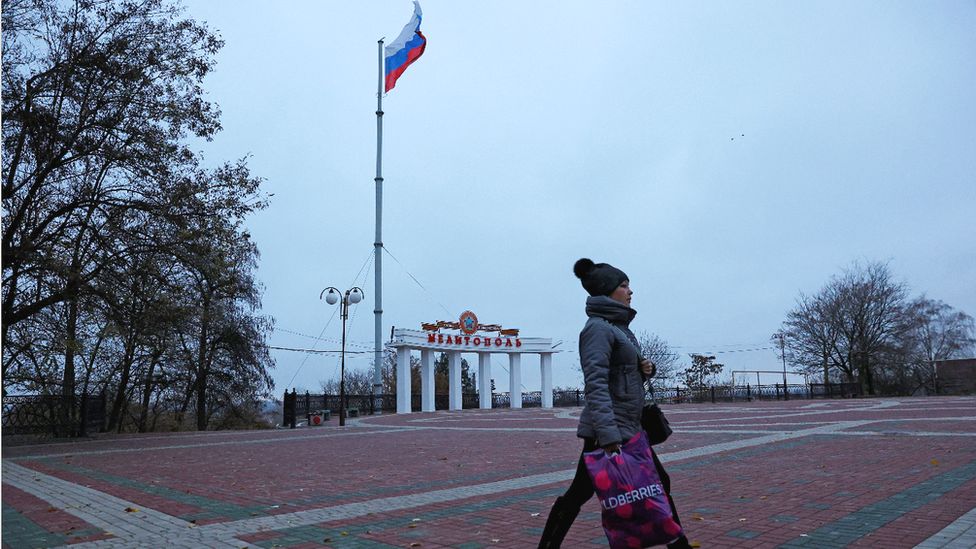Russian authorities crack down on abortion access amid demographic crisis
Published27 minutes agoShareclose panelShare pageCopy linkAbout sharingImage source, AlamyBy Vitaly ShevchenkoRussia editor, BBC MonitoringRussian authorities are limiting access to abortions in an attempt to confront the country’s longstanding demographic crisis. Measures include making it an offence trying to persuade a woman to have an abortion and pressuring private clinics to stop carrying out the procedure.Feminist groups say the campaign is putting the lives of women at risk.The Russian Orthodox Church, which has close ties to the Kremlin, is playing a key role in the anti-abortion campaign. “As a member of the clergy, I testify that an abortion is a disaster and a tragedy for the woman those close to her,” Patriarch Kirill, the Kremlin-backed head of the church, said in January 2023.Image source, Urals Feminist Movement “Officials, ultra-right politicians and the church are actively forcing women and girls to give birth to unwanted children,” said the Urals Feminist Movement group, which has organised small-scale protests in favour of abortion rights.”These initiatives will only lead to a dramatic increase in the number of illegal abortions and a huge number of maimed and killed Russian women.”A stagnant populationRussia’s population is virtually the same size as it was over 20 years ago. According to official figures, there are now 144 million people in Russia – 2 million fewer than in 2001, when President Vladimir Putin first came to power. Religious authorities say a key factor for the demographic crisis is the high number of abortions. Almost a third of Russian women say they have had one. In 2022, more than 500,000 pregnancies were terminated, compared to 1.3 million children born in Russia. Mr Putin called it “an acute problem”. “The population can be increased as if by waving a magic wand: if we solve this problem and learn how to dissuade women from having abortions, statistics will go up immediately,” according to Patriarch Kirill.Authorities are concerned that the decreasing number of young people, particularly men, will make it more difficult for the Russian military to recruit soldiers. There are also worries about the effects of a stagnant population on the economy.Image source, Getty ImagesRussian feminists say women’s rights are being curtailed to benefit the military and economy. “They need new taxpayers, they need new soldiers,” Maria Mueller, of the Russian feminist association Ona, told the BBC. State policy of discouraging abortions The authorities are increasingly seeking to informally limit abortions, though the country’s laws remain on paper some of the most liberal in the world.The Health Ministry has dawn up guidelines telling medics how best to dissuade women from having an abortion. Doctors are encouraged to tell pregnant women who are younger than 18 that young parents bond better with their children “because they are practically from the same generation”. If a pregnant woman is single, doctors are meant to tell her that “having a child is no obstacle to finding a life partner”.In parallel, the authorities are restricting the sale of medication used to end pregnancies, sales of which increased by over 50% last year. From September 2024, pharmacies will be required to register the sale of such pills in special databases. The government is also offering financial incentives to pregnant women and those who give birth, including payments of up to 524,500 roubles (£4,680, $5,830) which can be used to purchase property or pay for schooling.A fifth of abortions in Russia are carried out in private clinics, which have come under pressure from religious authorities to stop offering the service. “As a member of the clergy, I testify that an abortion is a disaster and a tragedy for the woman and those close to her,” Patriarch Kirill said. Image source, Getty ImagesAccordingly, governors in 10 Russian regions are making efforts to stop private clinics from performing abortions.The annexed Ukrainian region of Crimea was the first territory where private clinics stopped performing abortions in early November. Days later, it was followed by the Kursk region, where four out of five private clinics no longer offer the service.Restricting access to abortions in private clinics will harm women’s health, World Health Organisation expert Lyubov Yerofeyeva told BBC Russian.The Kursk region deputy governor, Andrei Belostotsky, called this “a significant event” because almost all women wishing to terminate their pregnancy will have to go to state hospitals, where the authorities will “actively work with them” trying to make them change their mind. Bans on ‘incitement to abortion’Another initiative proposed by Patriarch Kirill and already implemented in parts of Russia is a ban on “incitement to abortion”. “We need more people. It’s an obvious fact recognised by everyone, both politicians and sociologists alike,” he told an Orthodox Church meeting. “But for this to happen you need to make real efforts,” he added.As an example, the patriarch pointed to the western region of Mordovia, which has introduced fines of up to 200,000 roubles ($2,250; £1,800) for trying to persuade a pregnant woman to have an abortion. He said such bans should be introduced across the country.Experts fear that the anti-abortion campaign will harm women’s health by discouraging safer medical abortions.”This will be a blow against medical abortions because this was the method promoted by the vast majority of private clinics. More than 80% of their procedures were medical abortions, while state hospitals mostly perform surgical ones,” the WHO’s Ms Yerofeyeva said. “Surgical abortions carry higher risks of complications, side effects and injuries. That’s why the whole world is moving away from them.”Ms Yerofeyeva also fears that the clampdown on legal abortions will trigger a spike in dangerous illegal procedures.More on this storyThe Russians snitching on colleagues and strangersPublished3 days agoRussian artist gets 7 years for anti-war messagesPublished6 days agoRussia goes back to prisons to feed its war machinePublished26 October
Read more →

